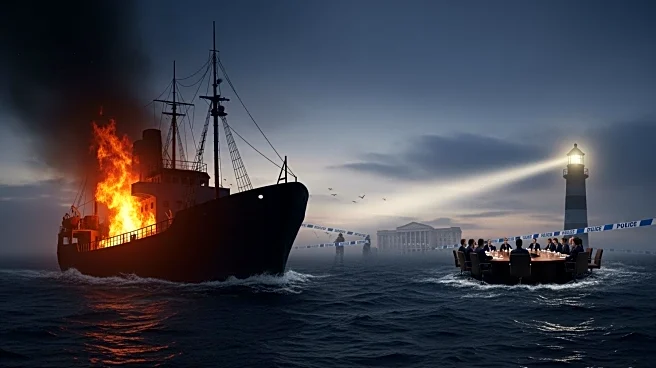What's Happening?
A Cameroon-flagged LPG carrier, identified as the Falcon, issued a distress call on October 18 while sailing near Yemen due to an explosion and subsequent fire. The European Union Naval Force (EUNAVFOR)
Aspides is coordinating a search and rescue operation involving a Greek frigate and French air assets. The vessel, which was approximately 130 miles southeast of Aden, reported that about 15 percent of it was engulfed in flames. The crew of 26, including one Ukrainian and 25 Indians, abandoned the ship. Two passing vessels, Meda and AK Carl, rescued 24 crew members, while one remains aboard the burning vessel and another is missing. The ship, built in 1994 and owned by an Indian company, has a history of safety deficiencies, including a hole in its hull and corroded ventilation pipes. The incident has raised suspicions of an attack by Houthi militants, although the group has denied involvement.
Why It's Important?
The incident highlights ongoing security concerns in the Gulf of Aden, a critical maritime route for global trade. The potential involvement of Houthi militants, despite their denial, underscores the region's volatility and the risks faced by commercial shipping. The Falcon's history of safety violations also raises questions about maritime safety standards and enforcement. The rescue operation demonstrates international cooperation in maritime security, with EUNAVFOR Aspides leading efforts to ensure the safety of the crew. The situation could impact shipping insurance rates and operational protocols in the region, affecting shipping companies and global supply chains.
What's Next?
EUNAVFOR Aspides continues to monitor the situation and coordinate rescue efforts. Further investigations will likely focus on determining the cause of the explosion and fire, as well as the vessel's compliance with safety regulations. The incident may prompt increased security measures and inspections for vessels operating in the Gulf of Aden. Shipping companies may reassess their routes and safety protocols to mitigate risks. The international community will be watching for any further developments or statements from the Houthis, which could influence regional security dynamics.
Beyond the Headlines
The incident raises broader questions about the enforcement of maritime safety standards and the responsibilities of ship owners in maintaining their vessels. The Falcon's history of deficiencies suggests systemic issues in the inspection and regulation of older ships. The geopolitical context, with tensions involving the Houthis and regional powers, adds complexity to maritime operations in the area. The event may lead to calls for stronger international oversight and cooperation to ensure the safety and security of global shipping lanes.









